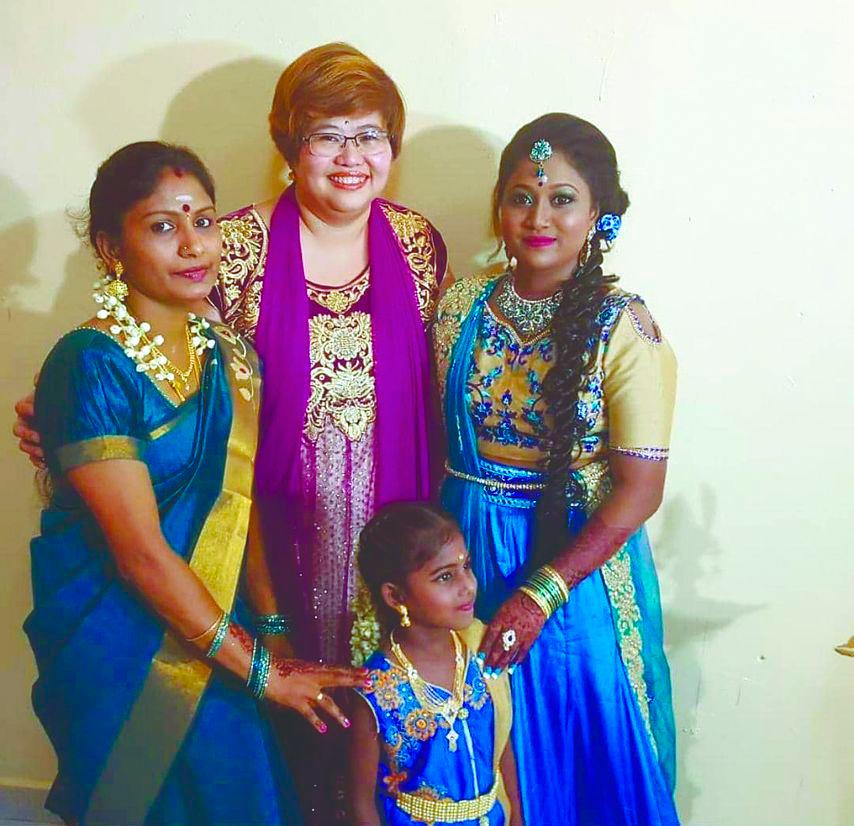PETALING JAYA: Not all mothers are bound by blood.
Sometimes, they are the ones who feed us, raise us and stand by us, regardless of race, religion or family ties.
For 48-year-old Irene, who also goes by her Indian name Rajeswary, family was never defined by ethnicity.
Born Chinese, she was raised not only by her biological mother but also by Indian and Malay families who embraced her as their own.
Now, she looks back with quiet, enduring gratitude for the women who shaped her life.
“I was babysat by them for over 15 years,” she said.
“The Indian and Malay mothers raised me as if I was their own.”
It was in their kitchens that she found her rhythm, slicing onions, stirring curries and learning the value of self-reliance.
“My Indian mother always got me to cook with her. She used to say, ‘No matter what you do in life, you must know how to cook.’ That’s something I still carry with me,” she said.
Things were quieter with her biological mother.
“My Chinese mum didn’t really ask me to help in the kitchen. But my Indian mom made it a point to teach me and I loved that. I felt involved,” she said.
Each mother gave her something different, her Malay mom instilled patience and calm, her Indian mom gave her boldness, structure and belief.
Through it all, they offered her a love that transcended culture.
“I was so close to them I even learned how to pray like them. With the Indian family, I picked up their prayers. With the Malay family, I learned to recite the Quran and perform Islamic prayers. They never forced me, it just made me feel included.”
Some memories remain especially vivid.
“The night before Deepavali, we’d gather to pray for those who had passed on. Afterwards, we’d all head back to Batu Arang to celebrate. My mom and dad would carry me around like I was a superstar. It’s one of the happiest memories of my childhood,” she said.
Living across cultures didn’t confuse her, it shaped her.
“I never struggled to adapt. I spent so much time with them, it all felt natural. I was the youngest, so I got spoiled by everyone,” she said with a grin.
Over time, her understanding of faith, tolerance and family deepened.
“Because I lived with them, I understand why Malays pray the way they do, why Friday khutbahs are loud, why Hindus have rituals. None of that bothers me, I lived it. I get it.”
Today, Irene credits her open-mindedness to a life surrounded by diversity.
“Living with people of different cultures taught me that we’re all just people. It showed me that love doesn’t care about skin colour.”
When Irene thinks of her Indian and Malay mothers, it’s not just one woman who comes to mind.
She honours all the women who taught her to live, to love, to believe and to cook.
That same spirit echoes in the story of 25-year-old Nur Nazeerah Ahmad Zaini, a Malay woman who also grew up with foster figures across racial lines.
But one in particular stands out: a woman she simply calls Mommy Kiara.
“I felt safe and secure around her. We weren’t related by blood, yet being with her felt like home,” Nazeerah said.
She was very young when she grew close to Kiara, an Indian neighbour who treated her like family.
Today, the memories are faint, but the feeling remains.
“She used to sit with me while I drew, buy me food and encourage me to chase my dreams,” she said.
“Besides my own mom, she was one of the first people who really believed in me.”
That early encouragement still fuels Nazeerah, especially now as she slowly builds a following for her art page, @artnosorous, taking commissions and rediscovering the passion that began with Kiara’s gentle support.
What makes her story even more poignant is that she can barely remember Kiara’s face.
“It’s a bit sad. Someone could love me that much and I can’t even recall her properly.”
Now grown, Nazeerah reflects on how her personality and her mother’s values helped her form bonds across cultures.
“I think being cheerful helped. But also, my mom taught me to be friendly, yet cautious. So I learned to open up.”
If she had the chance to speak to Kiara today, Nazeerah knows exactly what she would say:
“Thank you for loving me like your own child. For making me happy, even when I was too young to remember it clearly.”









